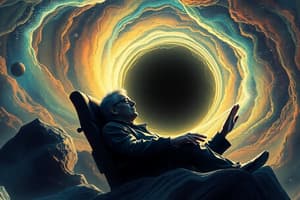Podcast
Questions and Answers
What happens to a person or object that crosses the event horizon of a black hole?
What happens to a person or object that crosses the event horizon of a black hole?
- They are instantly destroyed upon crossing.
- They inevitably move toward the singularity. (correct)
- They can escape back to the outside of the black hole.
- They continue to exist indefinitely within the black hole.
According to Einstein's theory of general relativity, how is a singularity best described?
According to Einstein's theory of general relativity, how is a singularity best described?
- As a portal to another dimension.
- As a source of immense gravitational pull.
- As a point where time ends. (correct)
- As a point of infinite density.
What does the black hole information paradox highlight?
What does the black hole information paradox highlight?
- Information is created in black holes.
- Information is always preserved in physical systems.
- Information cannot escape a black hole.
- Information is destroyed when matter falls into a black hole. (correct)
What is the relationship between the event horizon and radiation emitted from it?
What is the relationship between the event horizon and radiation emitted from it?
What is one proposed reason for the formation of black holes?
What is one proposed reason for the formation of black holes?
In the context of black holes, what does the term 'Horizon' refer to?
In the context of black holes, what does the term 'Horizon' refer to?
Why is it said that once you cross the event horizon, you cannot turn back?
Why is it said that once you cross the event horizon, you cannot turn back?
In which year did Einstein propose his theory of general relativity?
In which year did Einstein propose his theory of general relativity?
How is the concept of time perceived once inside a black hole?
How is the concept of time perceived once inside a black hole?
What significance does the singularity hold in relation to information?
What significance does the singularity hold in relation to information?
What does Stephen Hawking's calculation indicate about black holes?
What does Stephen Hawking's calculation indicate about black holes?
What is Hawking radiation?
What is Hawking radiation?
How did Stephen Hawking's views contradict previous scientific beliefs?
How did Stephen Hawking's views contradict previous scientific beliefs?
What happens to black holes over time due to Hawking radiation?
What happens to black holes over time due to Hawking radiation?
What significant point arises from Hawking's calculation regarding information?
What significant point arises from Hawking's calculation regarding information?
What defines the event horizon of a black hole?
What defines the event horizon of a black hole?
How does Hawking radiation influence our understanding of physics?
How does Hawking radiation influence our understanding of physics?
What did Stephen Hawking calculate regarding the temperature of black holes?
What did Stephen Hawking calculate regarding the temperature of black holes?
What significant question about black holes was posed by Stephen Hawking in the 1970s?
What significant question about black holes was posed by Stephen Hawking in the 1970s?
What happens theoretically when an object falls into a black hole?
What happens theoretically when an object falls into a black hole?
Which black hole is described as the smaller of the two noted in the discussion?
Which black hole is described as the smaller of the two noted in the discussion?
What does the principle of conservation of information suggest?
What does the principle of conservation of information suggest?
What is significant about the photographs of black holes taken by radio telescopes?
What is significant about the photographs of black holes taken by radio telescopes?
What do black holes represent in the context of physics?
What do black holes represent in the context of physics?
What is the Swartzschild radius related to in the context of black holes?
What is the Swartzschild radius related to in the context of black holes?
What could theoretically happen if Hawking radiation continued indefinitely?
What could theoretically happen if Hawking radiation continued indefinitely?
What role do gravitational waves play in the study of black holes?
What role do gravitational waves play in the study of black holes?
What does the equation inscribed in Hawking's memorial stone represent?
What does the equation inscribed in Hawking's memorial stone represent?
How might one perceive falling into a black hole?
How might one perceive falling into a black hole?
What is the significance of the Chandra x-ray image mentioned in relation to the M87 black hole?
What is the significance of the Chandra x-ray image mentioned in relation to the M87 black hole?
How does the detection of gravitational waves affect our understanding of the universe?
How does the detection of gravitational waves affect our understanding of the universe?
What is the purpose of the LIGO experiment?
What is the purpose of the LIGO experiment?
What can be inferred about the black hole in M87 based on its mass?
What can be inferred about the black hole in M87 based on its mass?
Which aspect of black holes did Einstein's theory predict?
Which aspect of black holes did Einstein's theory predict?
What is the implication of detecting tiny shifts in the length of laser beams in LIGO?
What is the implication of detecting tiny shifts in the length of laser beams in LIGO?
What phenomenon does the term 'Storm in time' refer to?
What phenomenon does the term 'Storm in time' refer to?
Which of the following statements regarding Sagittarius A* is true?
Which of the following statements regarding Sagittarius A* is true?
How does material behave around black holes, as described in the analysis?
How does material behave around black holes, as described in the analysis?
What is the primary method used to study black holes currently?
What is the primary method used to study black holes currently?
Flashcards
Black Hole
Black Hole
A region of spacetime where gravity is so strong that nothing, not even light, can escape.
Event Horizon
Event Horizon
The point of no return for a black hole. Objects that pass the event horizon cannot escape.
Sagittarius A*
Sagittarius A*
A supermassive black hole found at the center of our Milky Way galaxy.
M87 Black Hole
M87 Black Hole
Signup and view all the flashcards
Schwarzschild Radius
Schwarzschild Radius
Signup and view all the flashcards
Accretion Disc
Accretion Disc
Signup and view all the flashcards
Supermassive Black Hole
Supermassive Black Hole
Signup and view all the flashcards
Gravitational Waves
Gravitational Waves
Signup and view all the flashcards
LIGO (Laser Interferometer Gravitational-Wave Observatory)
LIGO (Laser Interferometer Gravitational-Wave Observatory)
Signup and view all the flashcards
Gravitational Lensing
Gravitational Lensing
Signup and view all the flashcards
Black Hole Merger
Black Hole Merger
Signup and view all the flashcards
Chandra X-ray Image
Chandra X-ray Image
Signup and view all the flashcards
Event Horizon Telescope
Event Horizon Telescope
Signup and view all the flashcards
Stephen Hawking
Stephen Hawking
Signup and view all the flashcards
Kip Thorne
Kip Thorne
Signup and view all the flashcards
What is a black hole?
What is a black hole?
Signup and view all the flashcards
What is the event horizon?
What is the event horizon?
Signup and view all the flashcards
What is the Singularity?
What is the Singularity?
Signup and view all the flashcards
What is the black hole information paradox?
What is the black hole information paradox?
Signup and view all the flashcards
What is Hawking radiation?
What is Hawking radiation?
Signup and view all the flashcards
How does Einstein's theory of general relativity relate to black holes?
How does Einstein's theory of general relativity relate to black holes?
Signup and view all the flashcards
How do black holes form?
How do black holes form?
Signup and view all the flashcards
What are supermassive black holes?
What are supermassive black holes?
Signup and view all the flashcards
What happens to information that enters a black hole?
What happens to information that enters a black hole?
Signup and view all the flashcards
Why is the black hole information paradox important?
Why is the black hole information paradox important?
Signup and view all the flashcards
What was wrong with Hawking's calculations?
What was wrong with Hawking's calculations?
Signup and view all the flashcards
How is information preserved in the universe?
How is information preserved in the universe?
Signup and view all the flashcards
Where is Hawking radiation emitted from?
Where is Hawking radiation emitted from?
Signup and view all the flashcards
How did Hawking's calculations violate the laws of physics?
How did Hawking's calculations violate the laws of physics?
Signup and view all the flashcards
What is the information loss paradox?
What is the information loss paradox?
Signup and view all the flashcards
How did Hawking's calculation disagree with the laws of physics?
How did Hawking's calculation disagree with the laws of physics?
Signup and view all the flashcards
What is the principle of information conservation?
What is the principle of information conservation?
Signup and view all the flashcards
How does the information loss paradox contradict the principle of information conservation?
How does the information loss paradox contradict the principle of information conservation?
Signup and view all the flashcards
What is a black hole physically?
What is a black hole physically?
Signup and view all the flashcards
How did Hawking's calculations change our understanding of black holes?
How did Hawking's calculations change our understanding of black holes?
Signup and view all the flashcards
Why is the information loss paradox important?
Why is the information loss paradox important?
Signup and view all the flashcards
How are black holes formed?
How are black holes formed?
Signup and view all the flashcards
Study Notes
Black Holes: Recent Discoveries and Theoretical Advances
- Recent progress in understanding black holes is highlighted, including observational and theoretical advancements.
- Stephen Hawking's 1970s/80s question regarding the fate of in-falling matter is gaining renewed interest.
- Study of black holes is primarily theoretical but aided by observational data (radio telescope photographs).
- Two notable black hole images have been captured: one in the center of our galaxy (Sagittarius A*, ~6 million solar masses), and another (M87, ~6 billion solar masses), located ~55 million light-years away.
- M87 black hole is substantially larger than Sagittarius A*.
- The Schwarzschild radius (the theoretical radius marking the point of no return for an object) plays a crucial role in describing black holes. For example, if our Sun were compressed within a 2-mile radius, it would form a black hole.
- The M87 black hole's Schwarzschild radius is larger than our solar system.
- Images reveal the accretion disc—a flat disc of rapidly orbiting material around the black hole, emitting significant radiation.
- Observed light bending around the black hole from the accretion disc aligns with Einstein's 1915 general relativity predictions.
- Gravitational wave detections provide another critical method to study black hole collisions.
- LIGO (Laser Interferometer Gravitational-Wave Observatory) detects tiny shifts in laser beams caused by the passing ripples in spacetime from these collisions (which occur millions of light-years away).
- Theoretical advances are important but are also trying to fix mistakes in earlier calculations.
- Hawking radiation: Black holes emit radiation at a very low temperature, causing them to shrink and eventually evaporate. This was a key and unexpected theoretical discovery in the 1970s. Hawking's calculation shows the existence of Hawking radiation for black holes.
- Hawking's calculation raised a paradox: if nothing escapes a black hole, how could there be any information about things that fall in? This is known as the black hole information paradox.
- The calculation suggests that black holes might erase information, a concept that is counterintuitive to fundamental laws of physics.
- Information is considered preserved in other physical processes, but in black hole calculations, information appears to vanish.
- The radiation from a black hole originates from its event horizon (the boundary beyond which nothing, not even light, can escape).
- The idea of the singularity as the point at which the collapse of a star to form a black hole could end in a point of infinite density is revisited. In general relativity, this point represents the end of time.
- Research efforts are ongoing to resolve this paradox.
Studying That Suits You
Use AI to generate personalized quizzes and flashcards to suit your learning preferences.
Description
Explore recent advancements in black hole research, focusing on groundbreaking observations and theoretical developments. This quiz covers key concepts such as Schwarzschild radius, notable black hole images, and ongoing questions surrounding the nature of these cosmic phenomena.





